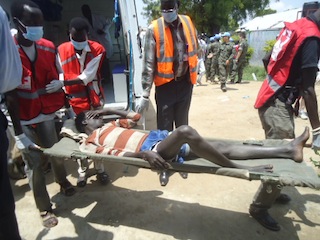Army committed “serious abuses” against civilians in Jonglei: HRW
July 19, 2013 (NAIROBI) – A rights groups said the South Sudanese army (SPLA) has committed serious abuses against civilians in its anti-insurgency campaign in Jonglei state, further inflaming ethnic tensions in the region.

The group has also accused the army, which is massed in largely empty towns, of failing to protect civilians from the latest attacks.
Fighting between the Lou Nuer and Murle again erupted in Jonglei state during the first week of July, when thousands of armed Lou Nuer men travelling on foot moved into remote areas of Jonglei’s Pibor county, an ethnic Murle area.
Murle and international organisations working in Jonglei allege that the army supported Lou Nuer groups with weapons and other supplies, including food and water.
Although HRW has not been able to confirm the allegations, it says they are serious enough to warrant and immediate government investigation.
ATTACKS CONDEMNED
HRW has called on South Sudanese president Salva Kiir to publicly condemn the attacks and ensure that authorities immediately investigate and identify all those responsible, including government officials.
It also urged Kiir to order the military to publicly investigate the actions of the army and hold abusive soldiers accountable.
“Yet again the government of South Sudan has utterly failed to stop armed Lou Nuer youth from moving into ethnic Murle areas, despite advance warnings that they were mobilising,” HRW’s Africa director, Daniel Bekele, said.
“This failure, together with a spate of serious abuses by soldiers in the area, only reinforces the perception that South Sudan’s leaders are taking sides in this ethnic conflict”, he added.
The government’s anti-insurgency campaign against David Yau Yau, a rebel leader and political aspirant from the Murle ethnic group, got underway in March.
South Sudan’s army deployed thousands of soldiers to Pibor county’s main towns – Pibor, Gumruk, Boma, and Manyabol – as part of the campaign.
Earlier this month, military officials told HRW that the soldiers, hampered by rain and a shortage of troops, would only be able to protect civilians in towns, not in remote areas. However, almost all Murle civilians had already fled the towns during the anti-insurgency campaign, often after soldiers committed serious abuses against civilians.
CIVILIANS FLEE VIOLENCE
“People fled to the bush because of the conflict between soldiers and rebels but also because of soldiers’ abuses that have made them afraid to return,” Bekele said. “Outside of the towns, Murle have no health or other services and are even more vulnerable to ethnic attacks.”
Tens of thousands of civilians have fled towns after fighting erupted between SPLA soldiers and Yau Yau’s group. HRW has also documented a string of serious abuses by soldiers against Murle civilians, including killings and widespread intimidation.
In interviews with HRW, witnesses reported that a number of civilians had been killed by soldiers, including women and children, between December and May in and around the town of Pibor.
HRW has also heard numerous accounts of verbal and physical abuse, as well as looting of civilian property by soldiers over the last months, especially in mid-May.
Both the SPLA and South Sudanese government have blamed alleged abuses committed by rogue soldiers on a lack of command and control, saying civilians were killed in crossfire between rebels and the army.
CALLS FOR INVESTIGATION
Although the total number of casualties remains unknown, the SPLA, and the UN Mission in South Sudan (UNMISS) airlifted nearly 200 injured Lou Nuer men to the state capital, Bor on 15 July, while injured Murle, estimated to be in the hundreds, have yet to be located.
HRW has called on UNMISS to conduct a full human rights investigation and report publicly on the conflict and the human rights abuses committed in Pibor county since the conflict between Yau Yau and the government intensified in August 2012.
These latest incidents follow serious abuses, including killings and torture, by the army during a disarmament campaign in 2012 and failures by the government to hold perpetrators of earlier ethnic violence to account, creating an environment of impunity.
Dozens of displaced Murle interviewed by HRW in June and July said that it was fear of further killings and looting by the soldiers in the town that made them flee.
On 18 July, the UN Office for the Coordination of Humanitarian Affairs (OCHA) reported that all six major population centres in Pibor had been abandoned, with about 40,000 inhabitants displaced. At least 8,500 Murle are estimated to have fled to neighbouring countries this year, while about 7,000 escaped to the South Sudanese capital, Juba.
“We were hoping that the soldiers were coming to protect us [from Yau Yau’s forces], but instead they are killing us,” said a Murle civilian from Pibor who fled to Juba.
The attacks in July have caused further displacement, with aid workers telling HRW that the recent clashes caused most civilians to flee Gumuruk, the only remaining town in Pibor county with a significant Murle civilian population.
“Soldiers have repeatedly committed serious crimes against civilians, which has fuelled distrust of the military and the depopulation of towns,” Bekele said.
“South Sudan’s leaders should ensure that soldiers protect civilians rather than abuse them, and the starting point is to hold abusive soldiers to account”, he added.
INADEQUATE RESPONSE
HRW says the government has supported piecemeal peace processes in Jonglei since 2012, and has failed to investigate ethnic violence, as well as claims that government officials may have been involved in organising the clashes.
It also accuses the government of showing a lack of will to prosecute leaders responsible for attacks on civilians and ensuring accountability for the crimes.
HRW has urged officials from South Sudan’s government and army to urgently condemn the attacks and ensure that all Lou Nuer fighters leave Pibor county, adding that those suspected of supporting or carrying out the attacks should be investigated and arrested.
(ST)
